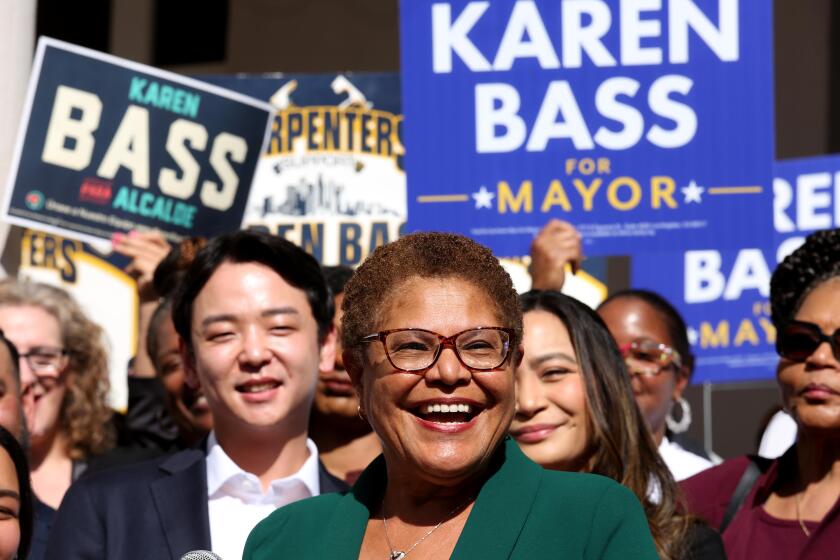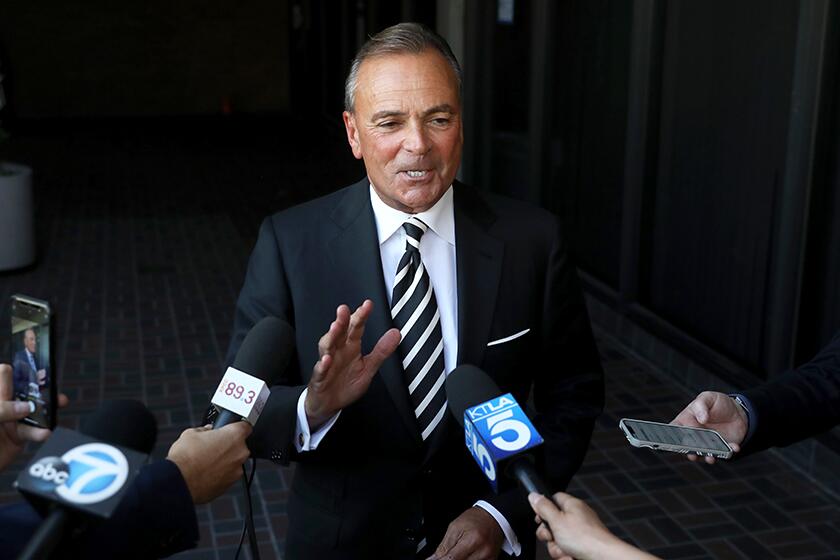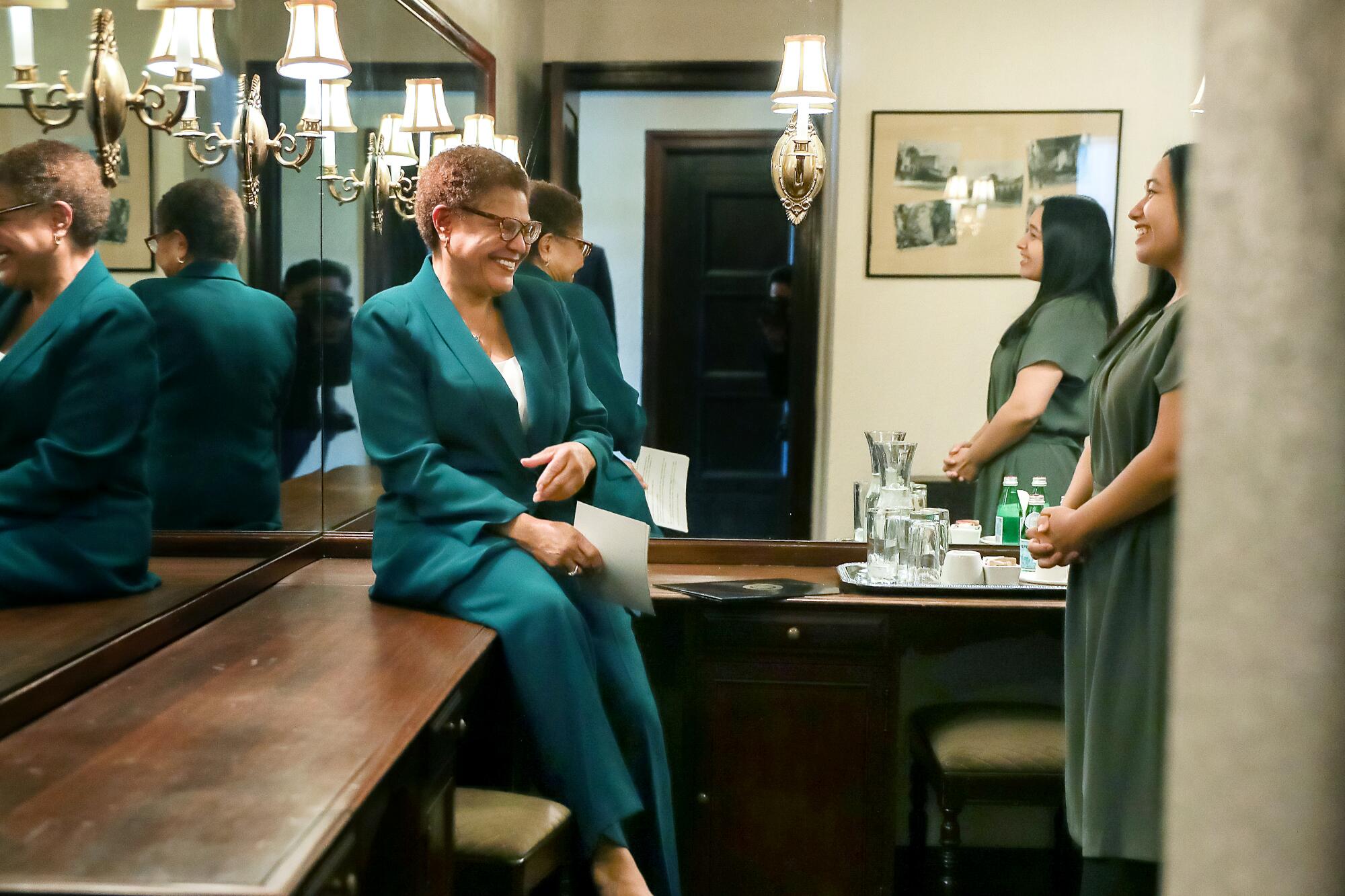
- Share via
As autumn settled over Los Angeles, Rep. Karen Bass suddenly found herself in a tight race with developer Rick Caruso.
The double-digit lead that polls showed she built through the summer had crumbled under a multimillion-dollar onslaught of attack ads. Clips of her giving a speech to a meeting of Scientologists over a decade ago aired in heavy rotation. Spots appeared on all platforms about a USC scholarship she received, which was being mentioned in the corruption prosecution of a city official.
Bass offered explanations for both, but had little money to respond with advertising of her own.
By mid-October, public and private polling showed the congresswoman only slightly ahead, or neck and neck. On Oct. 17, the campaign’s own polling showed the race tied, 45% to 45%.
“We just felt the barrage of dollars and we couldn’t show anything yet,” said Community Coalition Chief Executive Alberto Retana, who runs the nonprofit Bass founded. “The volunteers were just calling and hearing people ask: ‘Is the Scientology thing true?’”
In need of a shot of momentum, Bass’ campaign team had their pollster, David Binder, write a memo about the state of the race. It was sent to political advisors to former President Obama.
Obama’s team had made clear earlier in the summer that his backing was unlikely and told people that his support would come only if it was necessary. “His strategy is to engage where he can help move the needle,” said Eric Schultz, an Obama advisor. Still, he’d been following the race closely, his daughters live in Los Angeles and he’d visited the city over the summer, according to people familiar with the matter.
Soon after Binder’s state of the race memo went out, an endorsement many were unsure would ever come appeared.
“I wanted to make sure I took some time out to talk to you personally just to say how proud I was of your campaign,” Obama said in a FaceTime call with Bass, which was recorded and the campaign hustled to get on the air as a television spot.
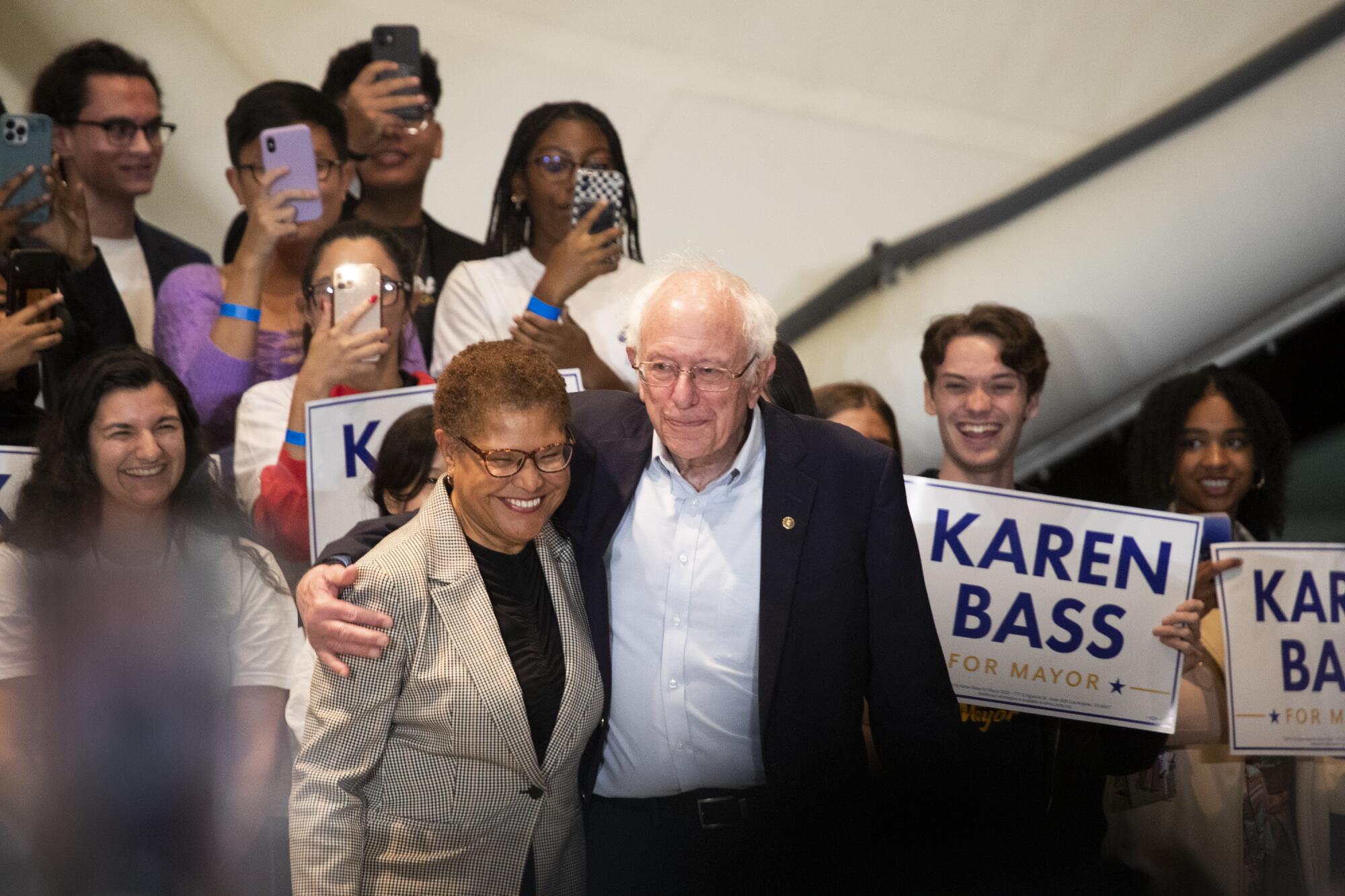
She was the only mayoral candidate Obama backed this cycle, capping a string of major endorsements and appearances from national political figures including Sen. Bernie Sanders (I-Vt.), Vice President Harris and President Biden.
Most political experts agree that no single endorsement holds much power. But together these nods from party bigwigs — who are popular in the city — highlighted the partisan divide between two people who called themselves Democrats and blunted Caruso’s ascent in the last weeks of the race. They also spoke to registered Democrats — liberals who were Bass’ base of support.
In a city as thoroughly blue as Los Angeles, Caruso’s defeat in some ways can be traced back to a single question: Were Angelenos willing to vote for someone who had been a Republican as recently as 2019?
Bass overcame Caruso’s enormous financial advantage. He spent more than $100 million of his own money.
Through her decades working in local, state and national politics, Bass was able to assemble a coalition that reiterated the starkness of this difference between the candidates. That calculus for voters was hyper-charged after the Dobbs Supreme Court decision during the spring, according to conversations with more than three dozen people who worked in or around the campaigns.
Even as Caruso continued to insist he supported abortion rights and always had, there was an evident doubt in voters’ minds about his motivations.
“Caruso spent $110 million trying to convince people he was a Democrat,” Bass’ lead advisor Doug Herman said. “There’s no equalizer to that kind of spending.”
In the end, the businessman put more than $100 million of his own money into his campaign, with roughly $58 million spent on advertising, about $16 million put into the field program, at least $3 million going toward consultants and more than $600,000 paid to a single party rental vendor for meetings and appearances.
That money couldn’t be matched but it could be countered, and the Obama endorsement was “the biggest weapon we had,” said Herman, who joined the campaign in December and insisted from the outset that Caruso had a ceiling of about 45% he’d struggle to top.
Votes are still being counted, but the current trend suggests that Bass will likely finish with something close to the 7-point margin she held over Caruso in the primary.
The relatively large lead Bass maintained through much of the race and her margin of victory papered over just how much turnover there had been in the early days of her campaign, which went through four fundraisers, swapped out general consultants and later parted ways with the campaign manager and a spokesperson.
All before the general election campaigning started in earnest.
“I think this was building a campaign on the fly,” said L.A. City Councilmember Marqueece Harris-Dawson, a longtime Bass friend and supporter. “I think it was pieced together, in a way that was haphazard, but Karen was insistent on getting it right and so she was willing to make the changes.”
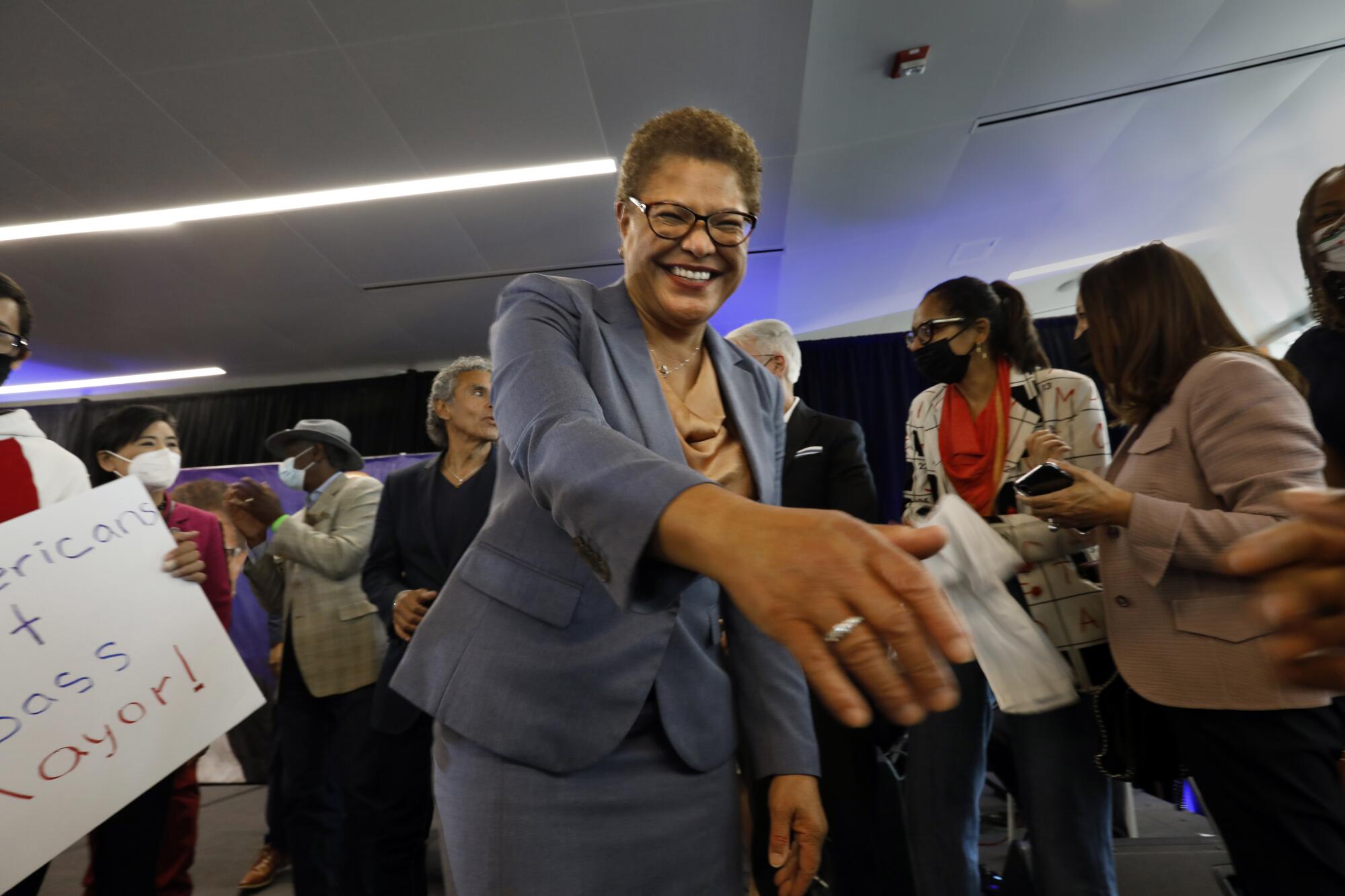
Through the summer of 2021, there were efforts to convince Bass to run, but it was an operation that went into overdrive when Councilmember Mark Ridley-Thomas announced he wouldn’t run for mayor. This freed up a lane for Bass, who had been a fixture in Sacramento and Washington, D.C., “to come home,” as she put it time and again, to help a city that was ailing.
The frantic preparation led to a massive kickoff event in October 2021 that included a spectacle of current and former elected officials at her side, including L.A County Dist. Atty. George Gascón, Antonio Villaraigosa and others along with more than 1,000 guests. An air of inevitability formed around her candidacy.
This coalescing belied something many people in Los Angeles politics knew about Bass: She had not run a tough race in some time.
During her tenure in Washington, she stayed connected to her district with regular town halls. But that work didn’t necessarily mean she was schooled in the gritty machinery of local government — particularly on the homelessness crisis — or acquainted with a new generation of progressive activists who’d come on the scene in recent years.
Harris-Dawson recalled doing a series of town halls with Bass during his 2015 council race.
“I remember her saying then: ‘Wow, like the city thing is a whole different set of issues than the state or federal government is,’” he said.
Much of the campaign’s early days were spent cultivating connections, fundraising and watching from afar as Caruso’s candidacy quietly took shape. Based on the team that the businessman brought in and the money he’d be willing to spend, Bass advisors knew he’d be stiff competition.
“It was pretty clear, relatively early on that this was going to be a contest between Caruso and Bass,” Binder said, noting that Councilman Kevin de León’s candidacy was one they took seriously at first.
Caruso, a successful developer with little name recognition, launched his bid in February, reshaping the race with a far more concrete message than Bass’: The city needed to be cleaned up, and he was the man to do that by hiring more cops and getting homeless people off the street.
The attempted recall of Gascón, which was rapidly collecting signatures, soon became a campaign issue — and an early example of how Caruso was defining the playing field, with the Bass campaign often being forced to react.
Caruso had initially supported Gascón’s criminal justice reform candidacy in 2020, then flip-flopped to backing the incumbent Gascón ousted.
But as Caruso leaned heavily into public safety as a campaign issue, it became clear he was going to support the recall and attack Bass’ ties to Gascón.
On the defensive, Bass threaded a delicate needle, saying she disagreed with Gascon on certain policies but didn’t support recalls. At one point she even asked that her name and face be removed from the endorsements section of the anti-recall effort’s website. The split-the-baby route — a common Bass tactic — managed to annoy both factions.
By April, Binder’s prediction of a two-person race had borne out: Caruso had ascended from barely known to polling equally with Bass, though most voters remained undecided.
The political mood in the early spring — dominated by frustration around homelessness and fears about rising violent crime — proved fertile ground for Caruso’s message.
People expected these street-level issues to be what the race was fought over, and if the mood had stuck, Caruso might have prevailed.
But the U.S. Supreme Court had other plans.
Caruso’s candidacy inspired comparisons to Republican entrepreneur Richard Riordan’s winning bid for mayor in 1993.
As Riordan’s term headed toward a close, businessman Steve Soboroff — a then-Republican who would go on to support Bass — gathered a handful of potential advisors to discuss running for mayor.
During the meeting, Ace Smith, who two decades later would become one of Caruso’s top strategists, asked Soboroff if he was “pro-life” or had given to any antiabortion groups. Soboroff told him he hadn’t.
“‘If you have, you’re going to lose. And I don’t even want to get involved,’” Soboroff recalled Smith telling him in 1999 — a moment when reproductive rights were in a far less tenuous place nationally.
Smith said in a text that he didn’t recall the conversation with Soboroff.
In the early stages of this race, abortion remained largely out of frame — a typical position in a blue-state mayoral campaign.
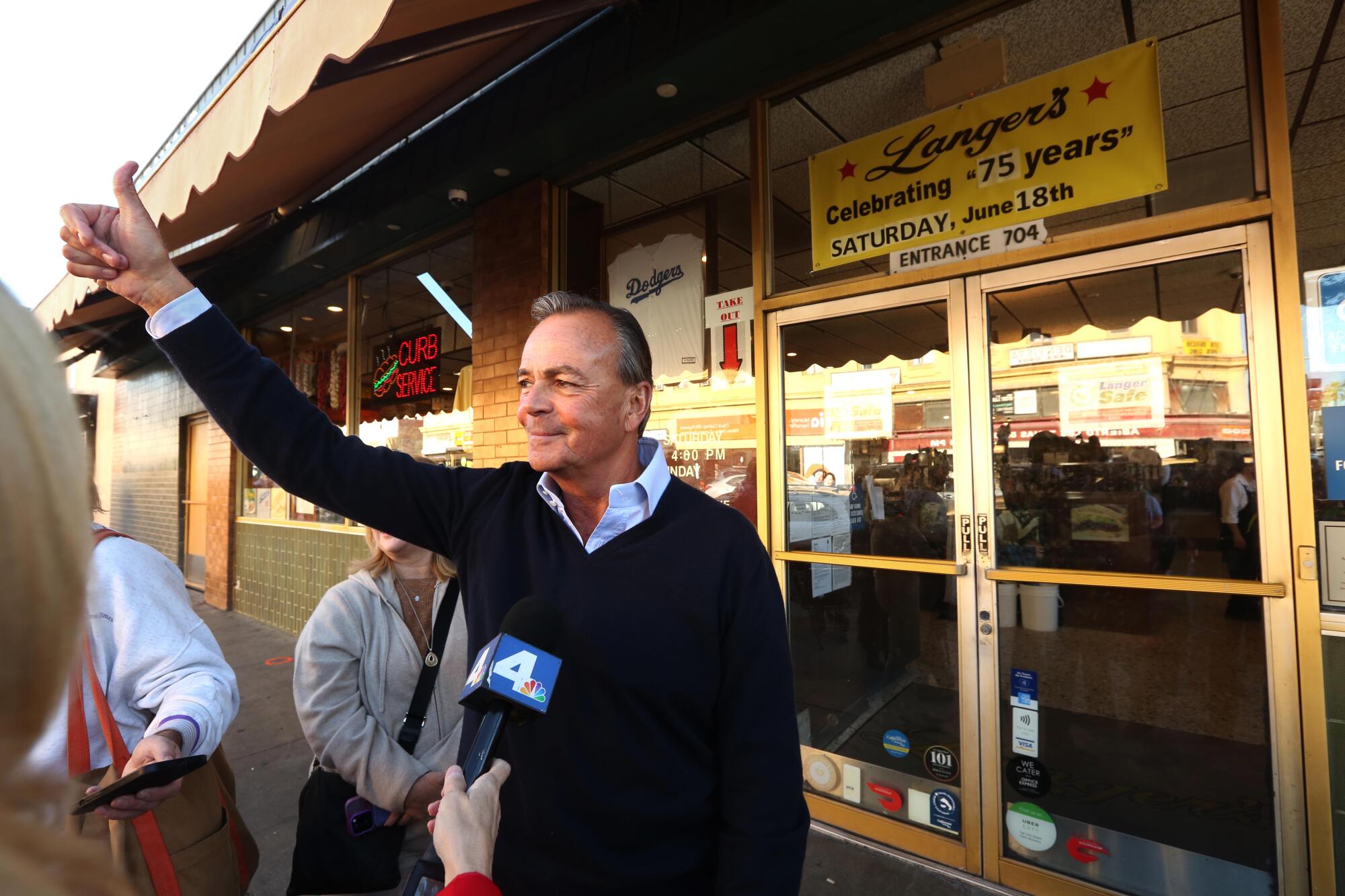
But focus groups and polling led Bass’ advisors, as well as an outside political action committee supporting her, to believe that Caruso’s past donations to Republicans and his shifting answers on abortion rights were two of his most potent vulnerabilities.
“We knew from the beginning that we were getting a partisan race,” said Morgan Miller, who ran one of the outside committees supporting Bass.
The pro-Bass PAC prepared to pounce in the first week of May.
Coordinating with the political arm of the local chapter of Planned Parenthood, they readied an open letter battering Caruso on the topic and cut a digital spot sounding the same notes. The timing was fortuitous.
Two days before their planned event, a leaked draft of the Supreme Court decision striking down Roe vs. Wade exploded into public view, igniting national outrage and fundamentally rewriting the narrative of the L.A. mayor’s race.
Caruso on Tuesday pledged $1 million to support an abortion rights ballot measure in California. But Planned Parenthood slammed him for actions in the past.
The developer’s Republican past and murky history on abortion rights became a millstone around his neck — especially after the Supreme Court moved forward with its decision just two weeks after the June primary.
Caruso — a longtime Republican who switched his party affiliation four times in the last 11 years and re-registered as a Democrat weeks before officially launching his mayoral bid — said repeatedly that he always supported abortion rights and found the Dobbs decision abhorrent.
But the issue was his extensive financial support for antiabortion politicians and comments in a 2007 magazine profile, which muddied that record.
In a Bass campaign poll, nearly 60% of respondents found messaging about Caruso’s ties to politicians who opposed abortion convincing or somewhat convincing. Labeling Caruso as not trustworthy and not in line with the city’s values became the broader focus of Bass’ allies, even as the biggest crises in the city were the centerpiece of so many of Caruso’s ads.
Images of tents were ever-present in these spots as he talked up a plan to increase the Los Angeles Police Department to 11,000 officers and build 30,000 homeless housing beds. Public polling even showed that voters thought he was better equipped to solve these crises than Bass, but ultimately voters had a more favorable impression of her.
After Bass’ strong showing in the June 7 primary, both campaigns settled into a quiet summer during which they retooled their staffs and spent less time making public appearances.
Some watchers of Los Angeles politics questioned just how dark Caruso went during these summer months, given the loss.
“I think there’s a false legend in politics that no one pays attention in the summer,” strategist Bill Carrick said. “He had a real dip in the summer not playing in July and August and only ramping it up later.”
Times polling in August found that among likely voters Bass was up by 21 points — 53% to 32%, with 14% undecided.
Get the lowdown on L.A. politics
Sign up for our L.A. City Hall newsletter to get weekly insights, scoops and analysis.
You may occasionally receive promotional content from the Los Angeles Times.
By September, though, Caruso was back with a vengeance, doing more public events in communities than in the spring and spending big on ads boosting his own profile and attacking Bass on two fronts: her ties to USC and that speech before the Scientologists.
He also invested in canvassing and phone-banking programs the likes of which Los Angeles had never seen. Thousands of calls to voters buttressed by hundreds of paid door knockers fanning out across neighborhoods full of voters — mostly Latino — who liked Caruso but were less likely to vote. Polling showed that his messaging on public safety and homelessness resonated strongly in working-class Asian American and Latino communities.
Caruso hoped to cut into Bass’ gains among white liberals and then turn out these lower propensity voters. Reshaping the electorate was his narrow — but potentially achievable — path to victory.
In early October, an earthquake shook city politics and it had nothing to do with the election. The Times obtained a secretly recorded audio of three City Council members and a labor leader engaged in a conversation full of racist and derogatory language.
The city convulsed with protests, tears and anger over the fraught state of race relations in the city. Both candidates saw in the scandal what made them decide to run. For Caruso, it was a broken and corrupt system, while Bass spoke of the need for a coalition that could heal wounds.
It’s difficult to say how the scandal ultimately affected the electorate, but Retana, who is close to Bass, said it was a galvanizing moment for her campaign. The tone of conversations at private gatherings and public events hosted by the campaign changed.
“That was a really critical moment in the home stretch for Karen and for the volunteers,” said Retana of Community Coalition. “The campaign volunteers got energized. Our community got energized.”
Still, during this time Caruso’s popularity rose in polls, while Bass stayed flat — but didn’t drop — at around 45%. For her advisors, his ascendance was a predictable consequence of a nonstop air assault. They maintained that the former community organizer had galvanized enough people to trust her, while also making enough people believe he was a Republican in Democratic clothes.
“When she speaks, she’s very reassuring,” said Larry Grisolano, who produced Bass’ commercials. “She took some serious volume of attack ads but her standing held up, and I think it has to do with the fact that she just wears well with people,”
Even so, one Bass staffer described the 10 days before Obama delivered his endorsement with Caruso closing in as “bleak.”
The campaign didn’t have the bandwidth, or funds, to go on the air attacking Caruso on other fronts — including his refusal to release his income tax returns, as Bass and other primary candidates had. Outside groups continued the barrage against him, but their spending was a trickle compared to Caruso’s flood.
“It was difficult to contend with because we knew we only had enough money for one bio ad,” said the aide, who declined to be named discussing internal campaign matters.
After Obama’s endorsement came through, the campaign quickly plowed every dollar it had into getting that endorsement on television. The spot blunted Caruso’s momentum and appearances alongside Harris and Sanders gave her campaign a jolt. The Bass campaign’s final poll showed her up 8 percentage points with likely voters.
Among ballots counted so far, Latino turnout is a little over half that of white turnout, according to Political Data Intelligence. But the Caruso turnout operation, which cost about $15 million in the general, may have actually kept the race from being a larger blowout.
Areen Ibranossian, a Caruso senior advisor, said the national mood “was different after the Supreme Court decision,” and it looked as though more voters’ decision-making process was based on partisan factors. He also pointed to the wins of West Hollywood City Councilmember Lindsey Horvath for supervisor and labor organizer Hugo Soto-Martinez as evidence that there “wasn’t necessarily a Democratic wave in this election but was a progressive wave.”
Still, for Ibranossian and other Caruso advisors who have been taking stock of the results in recent days, that national mood around abortion and the candidate’s prior Republican ties were a label the businessman couldn’t shake.
“The polling showed voters thought Rick was best positioned to address crime, the economy and homelessness. The messaging worked. We won the argument,” Ibranossian said. “People did trust Rick to do a better job but ultimately voters couldn’t hold their nose [on the partisan issue] and make the choice. They thought: ‘He doesn’t feel like a Democrat despite some thinking he would do a better job on issues.’”
Times staff writers Noah Bierman and James Rainey contributed to this report.
More to Read
Sign up for Essential California
The most important California stories and recommendations in your inbox every morning.
You may occasionally receive promotional content from the Los Angeles Times.
